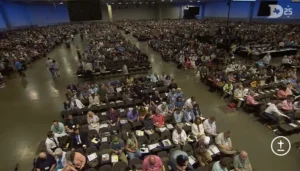Tennessee Messengers Make Their Voices Heard
DALLAS — Southern Baptist messengers to the 2025 Annual Meeting rejected an amendment Wednesday that would have required the Southern Baptist Convention to publish detailed financial information like IRS Form 990 disclosures.
The vote defeated efforts to force greater financial transparency from denominational leadership and entities, despite growing calls from some messengers for more oversight of how their contributions are managed. Jeff Iorg, president and CEO of the SBC Executive Committee, strongly opposed the amendment, arguing that Southern Baptist entities fought legal battles decades ago to establish First Amendment protections from such reporting requirements.
“We are not trying to hide behind that ruling, but we are instead defending that ruling,” Iorg said. “Voluntarily offering that kind of information sends a signal that we find ourselves in some way subject to federal government oversight, which none of us want.”
Erik Smith from Canon Baptist Church in Georgia advocated for transparency and made the motion for the amendment Tuesday morning, requesting that all SBC entities publish the same detailed financial information nonprofits disclose on IRS Form 990 — the public tax document that shows executive compensation, major expenses and other financial details.
An attempted amendment to the motion by Rhett Burns, pastor of First Baptist Church of Travelers Rest, S.C., to require these financial disclosures was rejected Wednesday.
The proposal sparked debate on the convention floor, with defenders of transparency opposed by those warning of legal and practical consequences. Iorg warned that the amendment would create legal conflicts between entities and the convention, forcing trustees to choose between their legal duties to their institutions and pleasing convention messengers. He also dismissed concerns about financial impropriety, noting that messengers already elect over 500 trustees to maintain financial accountability.
“The processes of transparency in Southern Baptist life are more robust than outside Southern Baptist life,” he said.
Why This Matters
Denominational entities have faced calls for reform in recent years leading to the proposed amendment. The transparency motion came amid broader questions about accountability and governance within the SBC for how Cooperative Program distributions, amounting to millions of dollars annually, are used for ministry support in areas such as:
- International and domestic missions
- Six SBC seminaries
- The Ethics and Religious Liberty Commission
- Various other denominational ministries
- State convention
Many of these entities currently provide basic financial reports, but critics argue they lack the detail needed for true accountability.
 Calls for Greater Accountability
Calls for Greater Accountability
Supporters of the transparency measure pushed back with personal appeals and comparisons to other organizations.
Josh Abbotoy, a messenger from Midway Baptist Church in Cookeville, Tennessee, drew on his small-church experience: “Every year, my pastor defends the church’s budget in front of the congregation, which is full of farmers, factory workers and grandparents on fixed incomes. If our little church can do it, I think we as a convention can do it too.”
Abbotoy, who described himself as a Harvard-trained lawyer and nonprofit operator, added: “I run a small nonprofit. Its budget is less than 1% of the SBC’s annual budget. We prepare a 990 — if we can do it, so can the SBC.”
John Michael LaRue from The Bridge Church in Miamisburg, Ohio, revealed what he called shocking information about trustee access to financial details. After contacting trustees from SBC entities, he found that “over 90% of our trustees are restricted from this information. They do not have access to executive-level salaries at the trustee board level.”
LaRue argued that the transparency measure would improve trustees’ ability to do their jobs by giving them access to information currently restricted to finance subcommittees.
“If our trustees don’t have this information, they need it to do their work,” he said, noting that some Baptist institutions, like Union University and North Greenville University, already submit such information without harm.
Opponents
John Piwetz from Crossroads Baptist Church in Elizabethtown, Kentucky, warned against the motion by referencing past transparency efforts that backfired. He reminded messengers of the convention’s decision to waive attorney-client privilege for greater transparency, which “invalidated our insurance policy and opened us up to massive legal monetary liabilities.”
“Did we end up getting more information from the Executive Committee? Yes. But did we unintentionally cost ourselves millions of dollars in the process? Yes, we did that too,” Piwetz said.
He argued that salary information lacks necessary context and would “inevitably generate disagreements, envy and division among churches, pastors and the peers of those whose salaries are publicized.”
The Vote
Chris Garner from Holly Grove Baptist Church in Bells, Tennessee, called the question on the amendment and the recommendation, which closed debate and opened the floor for voting.
Messengers voted down the transparency amendment during Wednesday morning’s business session. B&R

